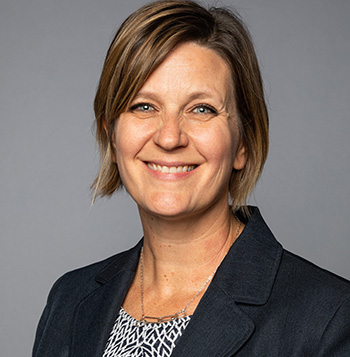Published on
Updated on

Rosalie Metro, assistant teaching professor, Learning, Teaching & Curriculum, in the College of Education and Human Development
Dr. Rose Metro won the Outstanding College Teaching – Early Career award from the College of Education and Human Development. In January, she facilitated a session at Teaching Renewal week with the T4LC on Self Reflection on Teaching. Her research is in the area of education of refugees and immigrants, specifically the experiences of Burmese refugee students in US schools.
As someone who is an educational researcher, how does Metro define student success?
“It means that students can succeed in our programs even though they have very different life circumstances,” she says.
They may be facing many challenges outside of school that can affect them mentally or physically and can make them feel isolated.
“Are we offering these students the support they need to complete our programs at similar rates to other students? Are we letting them know that they’re not alone, that we want them to succeed, and that we can help them,” asks Metro. “This is what it takes to fulfill our land grant mission of serving ALL the people of Missouri.”
Some actions being taken in the College of Education and Human Development include providing students with food who have financial difficulties through the Mizzou Ed Exchange. Metro believes their basic needs need to be met first before they are able to learn properly. Faculty and staff can help by connecting student with campus resources to help them.
“If students do not feel safe, if they do not have enough to eat, and if they do not have a sense of belonging, chances are low that they will absorb much information or be able to apply their knowledge.”
One recommendation Metro would make to improve student success:
“Representation matters. Having instructors who are as diverse as our student population in terms of race, ethnicity, nationality and language; socio-economic background; and being first-generation in college can all improve student success, because these instructors are more likely to understand the issues that students are facing.”

Ruth Crozier, Director of Advising, College of Arts & Science
Ruth Crozier is a member of two of the student success subcommittees. The first is an academic action group looking at making policies clearer for students transitioning from an academic probation or moving academic divisions. The other is a policy subcommittee that is examining the new tiered tuition model. The aim of both groups is to make policies easier for students to understand and to navigate.
The areas the subcommittees are examining stem from the discussions at last fall’s student success retreat hosted by the Office of the Provost. Crozier was in attendance at that retreat and says it was “energizing.”
“It was incredibly informative and helpful to hear initiatives in progress, in development, and ideas for things we can bring to our campus, from the ways our campus is moving forward with student success initiatives that impact first-year students, students who need financial support, students with disabilities, and students who are first-generation,” she says.
Arts and Science is working on improving student success within their college. One way is adding more advisors in the college and offering professional development opportunities for them so they are able to connect students with the campus resources they may need. There also will be a new student success space in Lowry Hall this summer. Finally, they are also planning a new peer navigation program for new students.
“A few years ago our College’s leadership focused on raising flags and kudos in MU Connect, particularly for large-enrollment courses that students from majors across campus take,” Crozier says. “In addition, A&S is focusing on strategies to reduce high D, F, W grades in large enrollment courses.”
As these student success committees are starting their work this semester, other faculty and staff may wonder how they can have an impact on student success, even those not working directly with students. How can we all help contribute to student success and why is it important for everyone?
“One is the benefit to the institution; simply put, we would not be here if not for our students, who become our alumni. Our success depends on their success,” says Crozier, “But something I believe is more powerful is universities like Mizzou contribute a great deal to the greater good. Our communities, state, and society benefit from students who fully engage in an institution like Mizzou and I know we all play a role in helping our students navigate the University. Our students benefit from developing powerful skills that allow them to think critically and creatively, problem solve, and be positive change agents.”